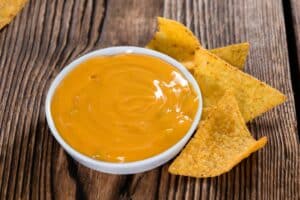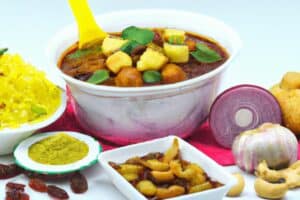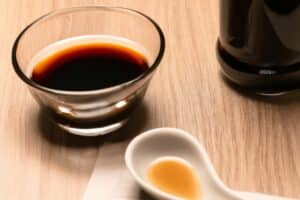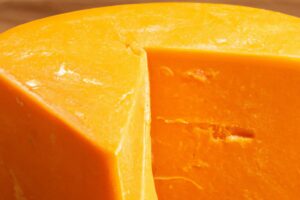While potato starch and potato flour may sound like different names for the same thing, these two items are actually quite different. Understanding the difference between potato starch and potato flour means you can make more informed decisions while cooking.
Here’s what you need to know about potato starch vs potato flour.
Related: Best Potato Flour Substitutes
The Differences between Potato Starch and Potato Flour
Even though both ingredients come from potatoes, there are a surprising number of differences between them.
1. How They Are Made
Potato starch requires a commercial environment for production, thanks to complex chemical processes and many steps.
On the other hand, potato flour is simple to prepare, and you don’t have to worry about separating the starch with potato flour.
2. Appearance
Potato starch is a white powder. With a magnifying glass, you’ll see large round granules. The overall look is very similar to cornstarch.
Potato flour more closely resembles wheat flour, both in terms of texture and color. Once dehydrated, potato flour can appear either off-white or white.
3. Properties
Potato starch is a popular choice in gluten-free bakeries and kitchens, thanks to its low gelatinization temperature and its impressive binding power. Not to mention potato starch is less likely to cause issues such as foaming or yellowing.
You can dissolve potato flour in cold water, and it has a heavier feel than potato starch. The viscosity of potato flour is higher than that of other flours. It’s also popular in baked goods since it absorbs a high amount of water and creates a moister product.
4. Nutrition
When it comes to nutritional value, potato starch falls short of potato flour. It goes through a more strenuous production process, which strips away many of a potato’s natural fat and protein quotients.
Alternatively, potato flour requires minimal processing, and while it’s still mainly carbohydrates, you still get some protein and fat in addition to potassium and vitamin B6.
5. Uses When Cooking
Both potato starch and potato flour are staples in most gluten-free diets. However, because potato starch has excellent thickening abilities, it’s frequently used when preparing dishes that require a heavier consistency (like soups or gravies) or with condiments.
You’ll also find potato starch as an ingredient in recipes for wine gums, bakery cream, potato chips, hotdog sausages, and noodles.
Potato flour is an excellent addition to recipes that use potatoes to enhance the potato’s natural flavor. Besides being popular with gluten-free cooks, you can combine potato flour with other flours for food items such as bread.
6. Taste
Potato starch is the way to go if you’re looking to thicken a recipe without adding additional flavor. However, if you want to enhance a dish’s potato flavor, you can’t go wrong with potato flour.
7. Health
Potato starch is wonderful for helping to regulate your blood sugar levels since it is a resistant starch (meaning it doesn’t go through changes while in your digestive tract). You may also want to consider potato starch if you’re looking to improve your insulin sensitivity or if you have metabolic syndrome.
Not to mention potato starch introduces the good kind of bacteria into your gut, which ferments and creates short-chain fatty acids.
Potato flour is touted for boosting mental health, blood condition, and immunity, thanks to its high levels of vitamin B6. It also helps keep your nervous system healthy and your blood pressure normal.
Potato Starch
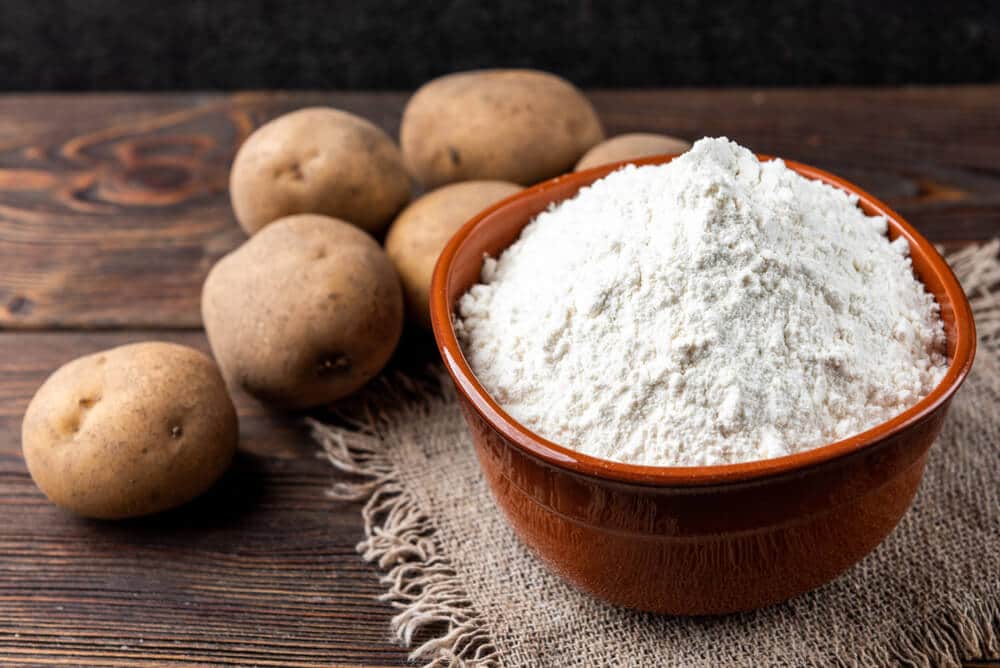
Potatoes are a wonderful source of many essential nutrients, such as carbohydrates, and also contain a high amount of starch. The starch originates from the tuberous roots, whose cells are full of leucoplasts. When someone extracts this element from a potato, you get potato starch.
How to Make Potato Starch
First, leucoplasts or starch grains are extracted from the potato. This process begins with the potatoes being thoroughly rinsed with water.
The cleaned potatoes are mechanically crushed to release the starch grains gathered from the cull pile (consisting of waste streams and any processed potato surplus). Workers use flume water to remove any dirt particles.
A sharp blade similar to a hammer mill or saw crushes the clean potatoes. At this point in the process, chemicals such as sulfur dioxide are used by workers to prevent oxidation or color changes. This process also eliminates skins and fiber from what now resembles mashed potatoes.
Now the starch can be separated by workers who also filter out any soluble material. A few more purification methods later, the potato is dewatered by workers, then dried to achieve the final product.
Potato Flour
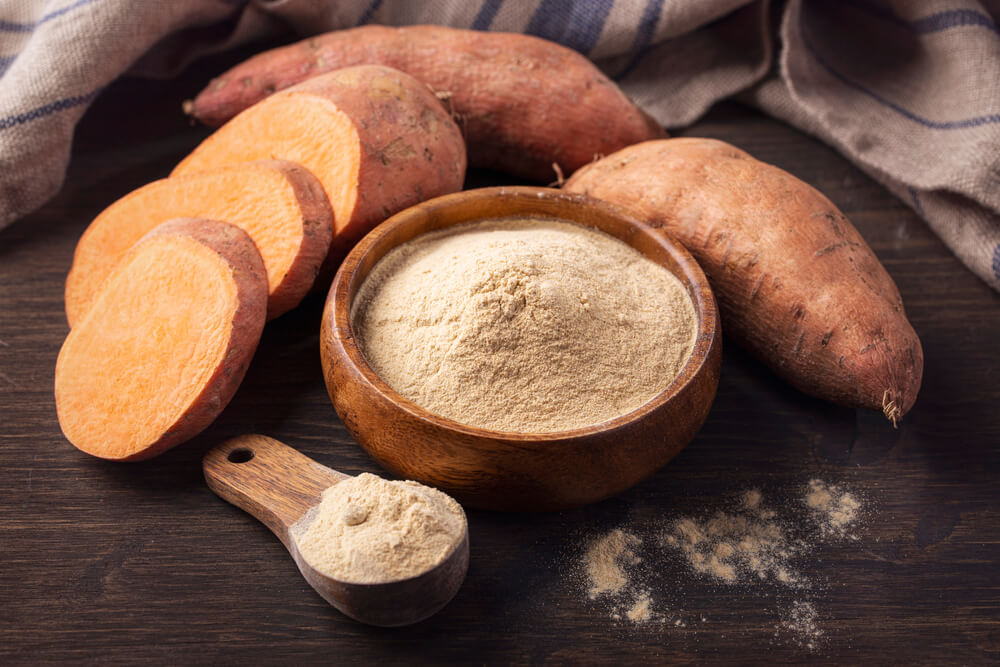
If you’re not afraid of a few extra carbs, then potato flour can be a great addition to many recipes. The process, which uses minimal complex chemical processes, maintains the potato’s natural flavor.
How to Make Potato Flour
One of the things we love about potato flour is that you don’t have to make a trip to the store to buy some. It’s simple enough to make a batch yourself to ensure maximum freshness.
A good rule of thumb is that you need about four times as many potatoes as you want flour. Peel the potatoes with a peeler, then place them into a pot. Cook the potatoes in gently boiling water until a fork stuck inside them comes out clean, then mash them.
You’ll need a dehydrator for the next step. Spread the mashed potatoes on the dehydrator, then let them dry for at least twelve hours.
Once the potatoes are dry, place them in a blender and run until you have a flour-like consistency. Once you’re done, make sure you store the potato flour in an airtight container.
Final Thoughts
When it comes down to potato starch vs potato flour, we definitely don’t recommend substituting either of these ingredients for the other. Their taste is noticeably different, not to mention potato starch is lighter in weight and tends to thicken foods. Replacing potato flour with potato starch may create an undesirable outcome for whatever you’re cooking.
Even though potato starch and potato flour have the same source, make sure you buy (or make) the right one for your recipe. Your taste buds will thank you.


